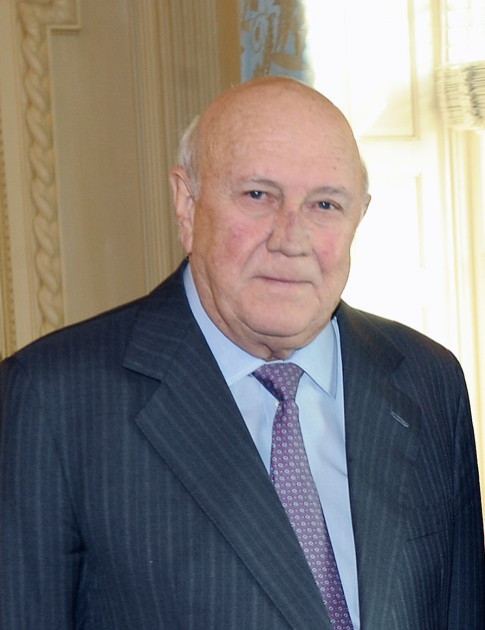South Africa: Former President De Klerk Blasts ANC For Using Race Card To Explain Social Inequalities

The last white president of South Africa, F.W. de Klerk, has come out swinging against the ruling African National Congress, accusing it of using race as an excuse for the government’s failure to ease the poverty and unemployment that is crippling the nation’s black majority.
De Klerk, who shared a Nobel Peace Prize with his successor Nelson Mandela for bringing the era of apartheid to an end, also warned that the spirit of reconciliation that characterized the transition to democracy and majority rule is vanishing
“Since Nelson Mandela’s retirement, there has been an exponential moving away from the emphasis he put on inclusivity and reconciliation -- that spirit has faded and is almost entirely gone now,” said the 76-year-old De Klerk at a conference in Johannesburg.
“I would imagine that in as much as reconciliation has faded and in as much racism is again prevalent, he would be sad about it.”
He also added: “All South Africans must get onto [the] playing field and become politically active.”
De Klerk reserved particular venom for the current ANC leader, President Jacob Zuma, who spoke of the “white control” of South Africa’s economy during a June policy speech. Zuma pointed out that whites, who represent only 9 percent of the nation’s population, control more than two-thirds of the companies on the Johannesburg Stock Exchange.
"The economic power relations of the apartheid era have in the main remained intact,” Zuma said then. “The ownership of the economy is still primarily in the hands of white males as it has always been."
Zuma also implied that black South Africans continue to suffer from the policies imposed under apartheid decades ago.
“The president [is] publicly saying that the biggest stumbling towards black advancement are white men,” De Klerk said of Zuma.
“Just read his speeches and the speeches of other prominent ANC leaders and you will find the speeches absolutely regularly raising the issue of race and blaming all their managerial failures and mistakes on apartheid and the past. … Racialism is called up, to my mind, in order to create a smokescreen behind which to hide the failure of good management and effective governance.”
De Klerk further alleged that extremist left-wing elements of the ANC, namely the Communists, were pushing the government into a dangerous area that would only drive the country deeper into chaos and poverty. He cited, among other measures, a call by some ANC members, including the former youth leader Julius Malema, for nationalizing the key mining industry and seizing white-owned properties for the benefit of blacks.
“[They want] to transform us into a Communist state. This is dangerous. Communism has been [proven] to fail,” De Klerk said.
De Klerk also lamented that whites are being unfairly blamed for South Africa’s pervasive social inequalities. (Unemployment among blacks is running at about 25 percent, with more than one-half of black youths jobless).
“The Mandela and [Thabo] Mbeki era of reconciliation is over,” he said.
“White males are quite unjustly blamed for the continuing triple crisis of unemployment, inequality and poverty. ... The black share of the South African economy has grown exponentially and dramatically. It is the job of government to improve that.”
William Gumede, a black South African author, told the Daily Telegraph newspaper of Britain that de Klerk was partially right.
“Racial divisions appear to have heightened because of continuing inequality along racial lines, and you will always have opportunistic politicians exploiting that,” he said.
This is not the first time de Klerk has attacked the black rulers of South Africa. In April of this year, he sparked outrage by criticizing his former partner, Nelson Mandela.
"I do not subscribe to the general hagiography surrounding Mandela," he said. "He was by no means the avuncular and saint-like figure so widely depicted today.”
A spokesman for the ANC condemned De Klerk’s remarks.
"De Klerk should acknowledge Mandela and his achievements and understand that his time has passed as a president," said ANC spokesman Keith Khoza.
De Klerk further ruffled feathers earlier this year when he appeared to defend some aspects of apartheid rule.
In an interview with CNN television, De Klerk said: "What I haven't apologized for is the original concept of seeking to bring justice to all South Africans through the concept of nation-states -- essentially creating two separate states, one black and one white.”
De Klerk said the policy of placing black people into separate homelands had its merits.
"If only the developed world would put so much money into Africa, which is struggling with poverty, as we poured into those homelands. How many universities were built? How many schools?... At that stage the goal was separate but equal, but separate but equal failed."
These remarks’ caused some critics in South Africa to demand that de Klerk be stripped of his Nobel Peace Prize.
"De Klerk doesn't deserve that prize given he thinks our homelands weren't indecent and apartheid not obviously immoral," blasted Eusebius McKaiser, a political commentator.
Another political analyst, Karima Brown, said of de Klerk: "He didn't abandon apartheid because he thought it was wrong but because it had become too expensive to uphold."
© Copyright IBTimes 2025. All rights reserved.





















